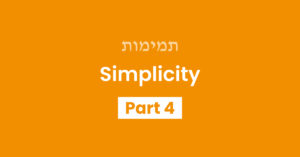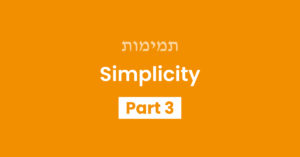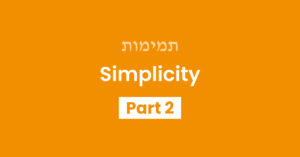If you were asked to list the “Top 10 Middos,” you would probably include some commonly-known middos such as being kind, patient, or giving.
However, there is one middah that most people would not think to mention, even though it is praised as one of the highest middos1: the middah of Temimus (simplicity).
The source of the requirement to be Tamim is a passuk in Devarim2 which says: “Tamim (תמים) Tihiyeh Im Hashem Elokecha – You should be tamim (pure/simple) with Hashem.” We also find that Hashem commanded Avraham Avinu: “His’haleich Lifanai V’heyeih Tamim – Walk before Me [Hashem] and be Tamim.”3 There are also many tzaddikim in Tanach who were praised for having the middah of temimus, such as Noach who was called an “Ish Tzaddik Tamim”4, Yaakov Avinu who was called an “Ish Tam“5, and Iyov who was called “Ish TamV’yashar”6.
What does it mean to be “tamim”? And how is being “simple” a good thing?
What does it mean to be “tamim”? And how is being “simple” a good thing?
This month, we will take a look at the middah of Temimus and see if we can understand what it means and how to apply it to our lives.
The Simple Son
Although we have just mentioned many instances where “tam” and “tamim” have a very positive meaning, there are actually some times that “tam” has a negative connotation – such as the “Tam” (simple son) in the Haggadah, who simply asks, “Mah Zos – What is this?” Asking a simple question is not the worst thing to do… but in the Haggadah, the “Simple Son” doesn’t seem to have the most positive reputation, either.
What is the common denominator between the simple “Tam” of the Haggadah, and the positive trait of Temimus which tzaddikim are praised for?
The Sifsei Chaim7 explains that the a Tamim person does not use his seichel (mind). He doesn’t think too hard. The Tam in the Haggadah doesn’t use his intellect because he doesn’t have it – he isn’t so smart, so he can’t possibly think too hard. But the tzaddik who is tamim doesn’t think too hard for a different reason – he chooses not to think too hard.
A Tamim person does not use his seichel (mind). He doesn’t think too hard.
Why would anyone choose not to think too hard?
Rav Dessler8 explains that while we generally do need to think about our actions, the danger of thinking too hard is that sometimes our minds can convince us to do the wrong thing. Sometimes our thoughts and lines of reasoning can be influenced by our bad middos, biases, ta’avos, and desires.
Sometimes our minds can convince us to do the wrong thing.
For example, a person might be tempted to cheat on his taxes, reasoning that it is better that he keep his own money to use for mitzvos, rather than to give it to the government. Or a person might wear something not tznius, reasoning that it’s OK to wear it because it makes them happy, and Hashem wants us all to be happy, right?
In these cases, the person is thinking too much. Their thoughts are causing them to be misled. They know the “simple” truth that we are required to pay taxes and wear tznius clothing. But they are letting their minds become carried away with excuses and crooked lines of reasoning.
A person who recognizes these crooked thoughts, and succeeds in overcoming the yetzer hara, is called a “tzaddik.” He is a righteous person who overcame the struggle between the voice of good and the voice of evil.
But, as Rav Dessler explains, there is a higher level than the tzaddik, and that is the level of the Tamim. A person who is Tamim doesn’t have to struggle between good and evil; he just naturally wants to do the right thing.
This is one way to understand what Dovid Hamelech writes in Tehillim: “I planned out my path, and my feet returned to your Torah.”9 Rav Yerucham Levovitz10 explains this passuk as follows: “I planned to go somewhere, but suddenly my feet just started walking on their own and I found myself in the Beis Medresh!” Most people make plans to go somewhere and then their mind tells their feet where to walk. But Dovid Hamelech’s body was so well-trained in doing Hashem’s will that his body was just naturally drawn to do mitzvos. His feet just picked themselves up on their on and walked to the Beis Medresh so that Dovid could learn more Torah.
This is what it means to be Tamim: Someone who is Tamim naturally does the right thing, and doesn’t fall prey to the excuses that the yetzer hara throws in his way. He is connected and listening to his inner voice of truth, and just naturally follows along in the path of truth. But even if we are not yet on the level of being Tamim, we can become closer to the level of Tamim every time that we train ourselves to make the right choice.
We can become closer to the level of Tamim every time that we train ourselves to make the right choice.
Going Back to Adam Harishon
Interestingly, this state of Temimus is how Adam Harishon was originally created, and also how we are supposed to be in the future, when Mashiach comes.
The Maharal11 explains: Before eating from the Eitz Hadaas, Adam fulfilled Hashem’s will perfectly and wholeheartedly, with temimus, because the voice of evil existed outside of his body. Only after he ate from the Tree of Knowledge did he start to hear the voice of evil within his own head, and he needed to start using his mind to figure out what the right thing to do is in every given situation.
In the future, when Mashiach comes, we will all return to that original state of Temimus. As the passuk says: “U’mal Hashem Elokecha Es Levavcha – Hashem will remove the foreskin from your heart.”12 The Ramban explains that the “foreskin” here refers to the yetzer hara – the ta’avos and desires that cover up the truth, and try to convince us to do the wrong thing. In the future, when Mashiach comes, Hashem will remove this yetzer hara and we will all be naturally inclined to fulfill Hashem’s will, and return to our original state of temimus like Adam had.
But in the meantime, it is our job to try to get as close to the level of Temimus as we can. Every time we do a mitzvah – every time we identify the voice of the yetzer hara and choose not to be convinced by his lies or excuses – we are strengthening the voice of truth inside of us and becoming more and more Tamim.
Sources: [1] Daas Torah Shemos pg. 331; [2] Devarim 18:13; [3] Bereishis 17:1; [4] Bereishis 6:9; [5] Bereishis 25:27; [6] Iyov 1:8; [7] Sifsei Chaim Bereishis pg. 319-326; [8] Michtav Mei’Eliyahu Vol. V. pg. 110 and onward; [9] Tehillim 119:59; [10] Daas Torah Shemos pg. 338; [11] Nesivos Olam: Netiv Hatemimus Chapter 1; [12] Devarim 30:6
Your Challenge
See if you can find an area of your life where you tend to make excuses to cover up doing what you know is right.
Once a day, catch yourself making excuses and consciously choose to do the right thing, instead.
For example:
- When you say Asher Yatzar, you usually start walking away before finishing the bracha. You tell yourself: “I have to rush and get back to work / start washing the dishes / make a phone call, so I don’t have time to stand here and focus on the bracha.” Instead, connect to your inner sense of Temimus and tell yourself: “I know that the most important thing right now is to focus while I say asher yatzar. My work/dishes/phone call can wait 20 seconds and nothing truly terrible will happen.”
- When you are at work, you sometimes spend time taking care of your personal business. You reason to yourself: “It doesn’t really matter because everyone else does it, so it can’t be that my boss expects me to work 100% of the time…” Instead, listen to your inner voice of Temimus and focus on doing only work during business hours.
- When walking into a building, you sometimes don’t hold the door open for the person behind you because you think, “I’m in a rush; I have important things to do.” Instead, acknowledge that holding the door will take just 2 seconds and will enable you to make a kiddush Hashem and brighten someone’s day.
- On Shabbos or Yom Tov, you tend to indulge in many unhealthy foods, thinking that this gives you Oneg Shabbos / Simchas Yuntif. Instead, listen to your inner voice of Temimus and recognize that Hashem wants you to be healthy so that you will have energy to serve Him. Stop eating the food when you know you have gone too far.
Torah Questions
- Which set of commandments comes right before the commandment in the Torah to be “tamim”? (See Devarim 18:13)
- How does Rashi explain what “tamim” means in Devarim 18:13?
- To whom did Hashem say, “Walk before Me, and be Tamim” (Bereishis 17:1)?
- How does Rashi explain the meaning of “Tamim” in the above passuk? (Give at least 1 of Rashi’s 3 explanations.)
- Who was called “Ish Tzaddik Tamim – a righteous and Tamim man”? (Bereishis 6:9)
- Which person said that Hashem is “Tamim” in Shmuel II Chapter 22?
Questions to Ponder
- The Midrash says that Moshe Rabbeinu acted with Temimus when he was praying on behalf of Sodom, asking Hashem not to destroy the city of Sodom. How was this an act of Temimus?
- The Gemara says: “Anyone who makes himself Tamim, Hashem will be Tamim with him.” (Nedarim 31b) What do you think it means for Hashem to be “Tamim” with a person?
- The passuk says “Tamim Tihiyeh Im Hashem Elokecha – Be Tamim with Hashem.” (Devarim 18:13) What do you think it means to be tamim WITH Hashem?
- Sometimes “temima” means “complete” – such as the Para Aduma which was called “temima” because it was completely red. (Rashi on Bamidbar 19:2) What do you think is the difference between being “tamim” and being “shaleim” (complete)?





